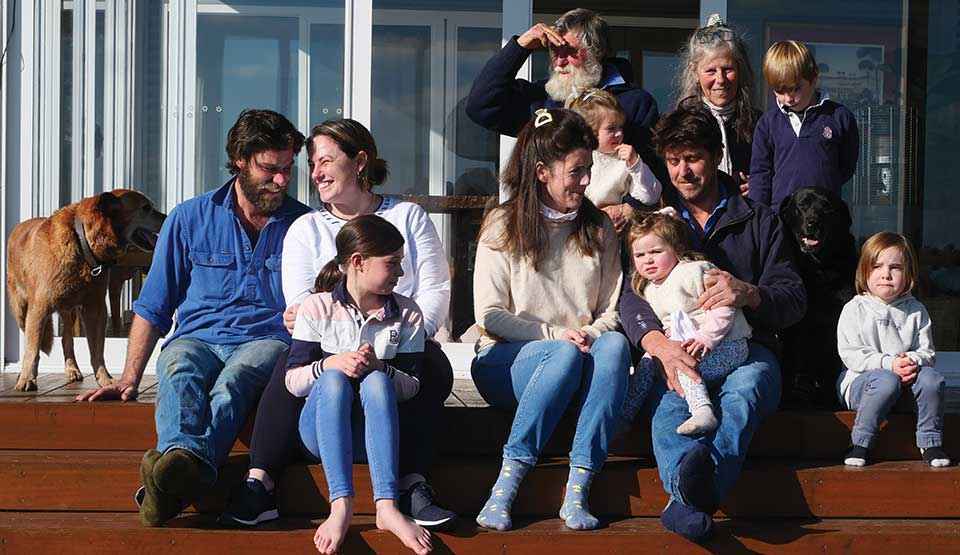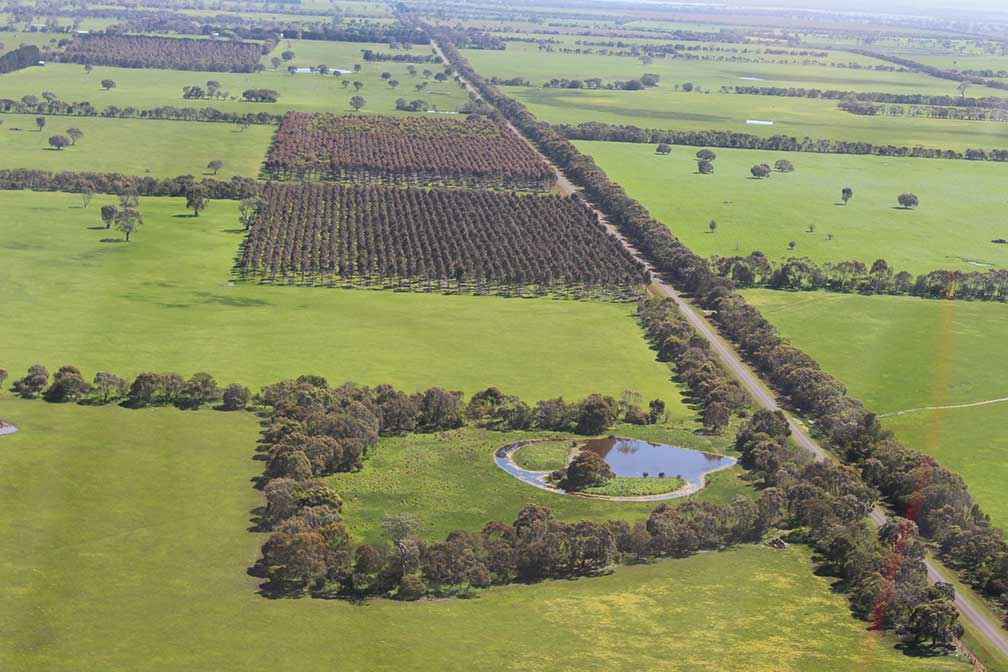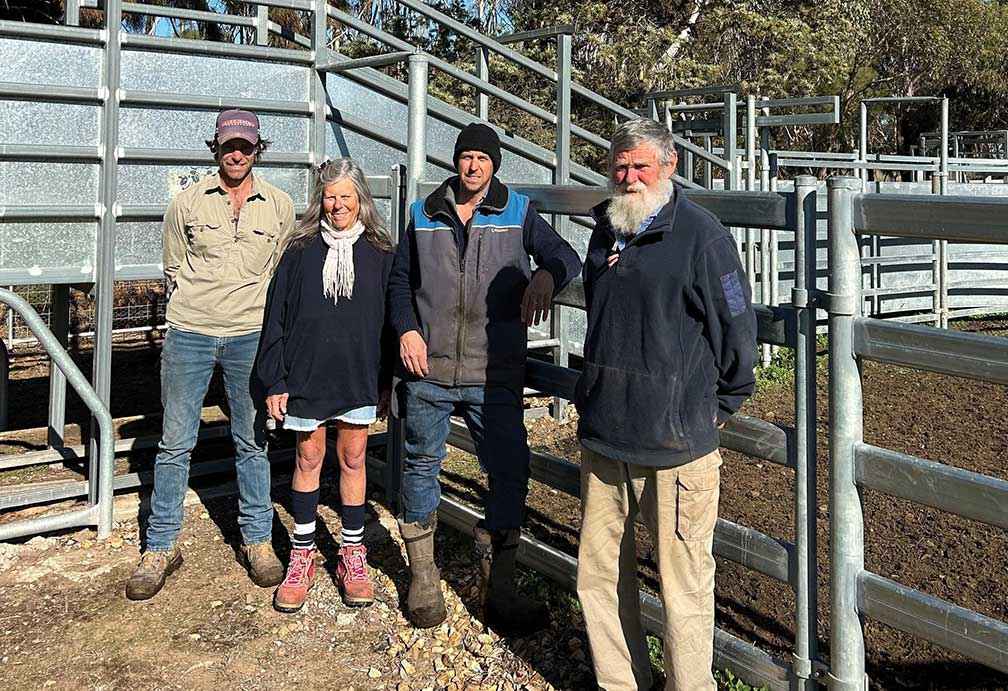Victorian Landcare Magazine - Winter 2024, Issue 87

Over almost 50 years, the Blackwell family has proven it is possible to run a profitable, high-production livestock enterprise and care for the land that supports it.
The family property Corea, southeast of Dunkeld, is located on the Victorian volcanic plains – a region characterised by vast, diverse productive grasslands, wetlands, creeks, and ancient red gum trees. Its history dates to 1904 when William Thomson, a Scot, bought the property to grow fine merino wool. His son and daughter-in-law later managed the farm, enduring two bushfires that devastated the land, vegetation, livestock, and infrastructure.
Despite these setbacks, the Thomson family persisted, and in 1975, William’s granddaughter, Cee Blackwell, and her husband, Bill, returned to manage Corea. A pivotal moment occurred when an Ararat stock agent quipped that they were going down to “Pleurisy Plains,” a remark that stuck with Bill. A severe summer storm followed, causing the loss of a significant number of lambs.
“Stock losses are hard to cope with in any farming situation,” Cee recalled.
“When you have a winter and you’ve got absolutely no shelter, and you think he (the stock agent) was right – there’s nothing between us and the South Pole.”
These events became the catalyst for change, prompting Bill and Cee to start planting trees. They focused on shelterbelts for livestock and creating wildlife corridors to provide habitat and safe passage for native species, including the superb fairy-wren, a bird that was abundant on neighbouring properties, but not seen at Corea.
The Blackwells collected seeds locally and from across Australia, planting trees through direct seeding and nursery-raised seedlings. The first plantation was decimated by hares and magpies, so they made protective tree guards using old fertiliser bags and sticks to ensure the young trees survived. Their commitment extended to planting individual trees throughout the landscape, often near the stumps of those lost in the 1940 and 1944 fires. Old iron water tanks from neighbours helped protect the trees from grazing livestock.
Tree planting became a family affair, with all members – and any visitors – taking part. More than 300,000 trees and shrubs have been planted across 150 hectares of the 2000 hectare property in the past 49 years.
“I think it was 17 years or more until we saw our first blue wren on the lawn, which was quite exciting.
“Now you drive around and turn the engine off and you can hear them everywhere. It’s fabulous,” Cee said.
After studying and working off-farm, Bill and Cee’s sons, Edward (Woody) and Charles, returned to Corea in the early 2000s and became partners. The third, fourth, and fifth generations of the family now live and work on the property.
The Blackwells understand the intrinsic links between land, water, and biodiversity. They aim to protect and enhance their land management practices while maintaining a profitable farm business.

Above: The Blackwell family has transformed Corea, fencing off waterways and planting more than 300,000 trees and shrubs.
Implementing rotational grazing of deep-rooted perennial pastures and following regenerative agriculture principles has allowed them to boost farm productivity and stocking rates to support the three families.
This grazing management approach promotes long-term pasture survival, reducing the need for chemical weed
and pest control, and improving soil health.
The Blackwells run self-replacing flocks of merino sheep and angus cattle, timing joining to match peak nutritional needs with peak pasture growth. Stocking rates have increased in the past 20 years and Corea now has a carrying capacity of 35,000 dry sheep equivalents.
Native vegetation provides valuable shade and shelter for livestock, reduces temperature extremes, slows wind speeds, and supports efficient feed usage, leading to 15 per cent higher survival rates for lambs.
Diverse tree plantings also enhance insect, bird, and mammal populations, which offer natural pest control and pollination services, complementing the integrated pest management program that minimises insecticide use.

Above: From left, Woody, Cee, Charles, and Bill Blackwell at Corea earlier this year. The family has proven it is possible to run a profitable, high-production livestock enterprise and care for the land that supports it.
Creek lines, wetlands and other water bodies have been fenced to exclude livestock and planted with diverse flora to protect waterways and support aquatic life. This practice also benefits livestock by providing clean water, enhancing growth rates, and reducing soil erosion and nutrient runoff.
To improve animal welfare, the Blackwells phased out mulesing 14 years ago by breeding a plainer-bodied, easy-care,high-production merino. Well-designed stockyards and a 15 kilometre laneway system across the farm facilitate low-stress stock movement.
Containment areas with ample shade, shelter, feed, and water are used in summer to ensure groundcover retention in the cropping paddocks. The Blackwells have partnered with local conservation groups, including Friends of the Forgotten Woodlands, to establish a seed orchard for native species and developed Sydney blue gum and sugar gum demonstration sites for farm forestry students.
“Everything we’ve done has been from the heart. We’ve tried to make the landscape a better place than what we found it for the livestock, the birds, and the humans,” Cee said.
These practices have earned recognition and access to markets that reward sustainable land management, such as the integrity mark ZQRX for their wool clip. They are also dipping their toes into carbon farming, having recently completed an initial carbon starter report, a precursor
to registering a carbon project.
The Blackwells’ dedication to sustainable farming extends to community involvement. Along with neighbours, they formed the now-defunct Nevertire Landcare Group, so-called because they never get tired of planting trees because the rewards are there.
Family members also hold leadership roles in various community, sporting and agricultural groups, and host numerous courses and workshops at Corea. Students from Lake Bolac, Dunkeld and Glenthompson schools have helped plant trees, and members of local Landcare groups and
Birdlife Hamilton, as well as researchers from IPM Technologies and La Trobe University, have conducted bird, insect, and flora surveys.
Despite the early challenges and scepticism from peers, the Blackwells have persisted, confident in their approach to revegetation – dismissed by many as a waste of good land – and later the adoption of regenerative and holistic management principles. Their efforts have not only improved farm productivity but also enhanced the landscape, demonstrating that high-production agriculture and environmental stewardship can coexist.